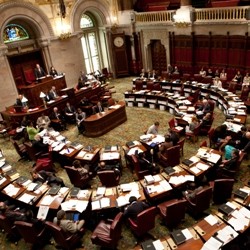New York Could Help Drive iPoker Efforts in Pennsylvania

Last year, everyone believed Pennsylvania and California would become the next two states to legalize online poker in 2016. But as often happens with gambling, something unexpected has developed–it now seems that New York has moved into the front-runner position for the most likely candidate to regulate iGaming before the end of the calendar year.
Good News Out of New York
In late March, the New York Senate finished a provisional budget proposal that included language that would legalize online poker across the state. Soon after, Gary Petlow, the current Chairman of the NY Assembly Racing and Wagering Committee, went on record as saying that he would be prepared to move forward with iGaming legislation provided that land-based casinos located in New York were supportive of the measure. With new casinos preparing to open, Petlow wants to ensure that there isn’t too much competition to hinder their success.
In the past, efforts to introduce online poker legislation in New York have been stymied by protests from the state’s racinos, but this time, it seems that race track-casino hybrids do not intend to fight the move. The President of the New York Gaming Association (NYGA), James Featherstonhaugh, a group that represents the racino industry, said that their previous concerns have been eliminated by the new wording. That’s a big change from his position back in September 2015, when he said that legalizing online poker within the next 2 to 3 years would hurt the racino industry.
A Push for Pennsylvania
It’s still unclear if New York will succeed in passing a budget with online poker legislation attached to it, but even if the move ultimately is unsuccessful, it could have an unintended benefit for the legalization movement.
Pennsylvania has been caught up in a debate over whether or not to pass HB 649, a bill sponsored by Representative John Payne who is the Chairman of the Pennsylvania House Gaming Oversight Committee. While lawmakers seem to be receptive to the idea of legalizing iGaming across the state and adding poker machines to Pennsylvania airports, progress has been slower than anticipated. At the end of 2015, many industry insiders thought legislation was imminent and could be passed with the Pennsylvania budget, but with the first quarter of 2016 now passed, we’re no closer than we were before.
Some industry experts believe that if New York does seriously consider legalizing online poker that Pennsylvania lawmakers will be spurred to action. The whole idea of legalizing online poker in the state arose from a desire to help the casinos in Pennsylvania remain profitable.
With New Jersey now slated to vote on whether or not to allow two casinos to open outside of Atlantic City, and with Ohio, Maryland and New York all planning to open casinos in the near future, Pennsylvania casinos will have more competition than ever before. It could be that lawmakers will feel compelled to be the first to legalize online poker to benefit the state’s casinos if there is any hope of the New York bill going forward.
Financial Benefits
New Jersey has generated $309.5 million in iGaming revenues since legislation was introduced in November 2013, including $149 million in 2015, of which more than $46 million has been collected by way of gambling taxes. Not only does such a figure present an enticing draw for Pennsylvania, but as mentioned the state is also now faced with the prospect of either expanding its own gambling market, or else watch its own gambling industry fall competitively behind those of its neighboring states.
Last month, PokerStars then gained access to New Jersey’s online gambling industry, and already the poker website has managed to increase iPoker traffic by an impressive 30%. The world’s biggest poker company therefore would be a valuable partner to work with Pennsylvania should the state decide to move forward with legislation, while the prospects of sharing liquidity with New Jersey presents further lucrative possibilities for the Keystone State.
In the meantime, Pennsylvania will be keen to enter the iGaming market ahead of New York, and with the latter having already added online poker to the Senate’s budget proposal, urgency in the matter suddenly becomes more pressing than ever before. Now that Pennsylvania’s has benefited from its wait-and-see approach to online gambling over the past few years, it must now recognize that sufficient information has been gathered to make pushing forward with regulation a viable and necessary option. Moreover, all signs seem to indicate that this is precisely what Pennsylvania legislators are now intending.










